The Struthof Concentration Camp stands as a haunting reminder of the Nazi regime’s callous disregard for human life. Established in 1941 in occupied France, this smaller detention facility initially held political prisoners before expanding to house Jews, Roma, and other groups targeted by the Nazis. The harsh conditions, forced labor, and brutal treatment of inmates at Struthof exemplify the horrors faced by those imprisoned within its walls. While the camp’s history remains a chilling testament to these atrocities, uncovering the full story reveals the profound impact this site continues to have on those who seek to understand its dark legacy.
Key Points
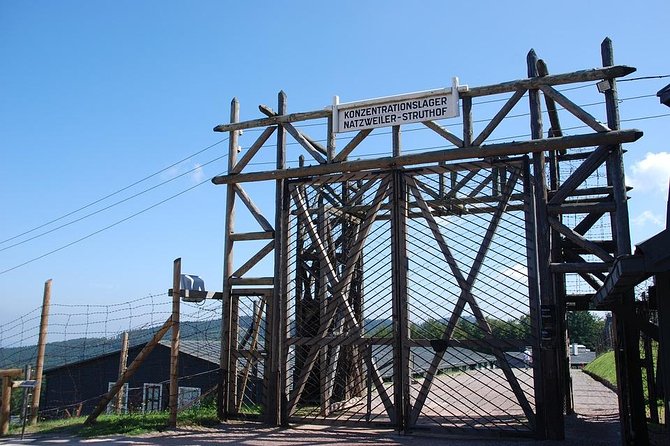
- Struthof was one of the smaller Nazi concentration camps established in 1941 in the Alsace region of northeastern France.
- The camp held French political prisoners, Jews, Roma, and other groups targeted by the Nazi regime, subjecting them to forced labor, medical experiments, and brutal treatment.
- Struthof serves as a sobering reminder of the atrocities committed by the Nazi regime during the Holocaust and stands as a memorial to its victims.
- Guided tours of the preserved remnants of the camp, including the crematorium and gas chambers, provide a powerful and educational experience for visitors.
- Ongoing preservation efforts ensure the historical integrity of the site and its continued role in commemorating the victims of the Nazi regime.
Overview of the Concentration Camp
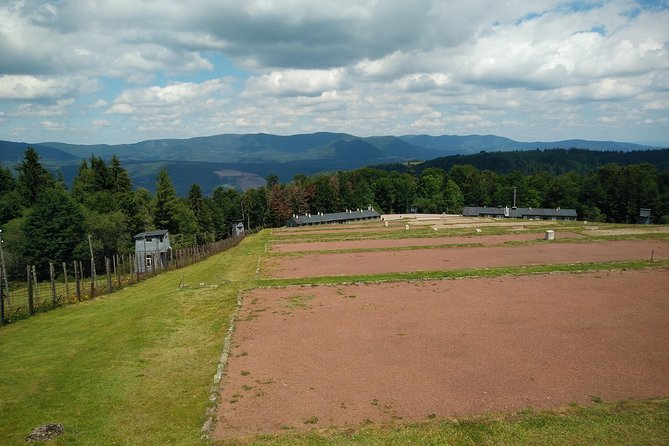
The Struthof Concentration Camp, located in the Alsace region of northeastern France, was one of the smaller Nazi concentration camps established during World War II. It was established in 1941 and operated until the camp’s liberation by Allied forces in 1944.
The camp initially held French political prisoners but later expanded to house Jews, Roma, and other groups targeted by the Nazi regime. Conditions at Struthof were harsh, with prisoners subjected to forced labor, medical experimentation, and harsh treatment by the guards.
Despite its small size, the Struthof camp serves as a sobering reminder of the atrocities committed by the Nazis during the Holocaust. Today, the site is a memorial and museum, preserving the memory of those who suffered and died there.
You can also read our reviews of more tours and experiences in Strasbourg.
Significance of the Struthof Site
Struthof’s significance lies in its role as a somber reminder of the atrocities committed by the Nazi regime during the Holocaust.
As one of the smaller concentration camps established in occupied France, Struthof’s history serves as a powerful testament to the horrors faced by prisoners subjected to forced labor, medical experimentation, and brutal treatment.
The camp’s remote location and the preserved remnants of its facilities offer visitors a chilling glimpse into the lives of those who suffered and perished within its walls.
Today, Struthof stands as a solemn memorial, a stark reminder of the importance of remembering the past to ensure such tragedies never occur again.
Historical Context of the Camp
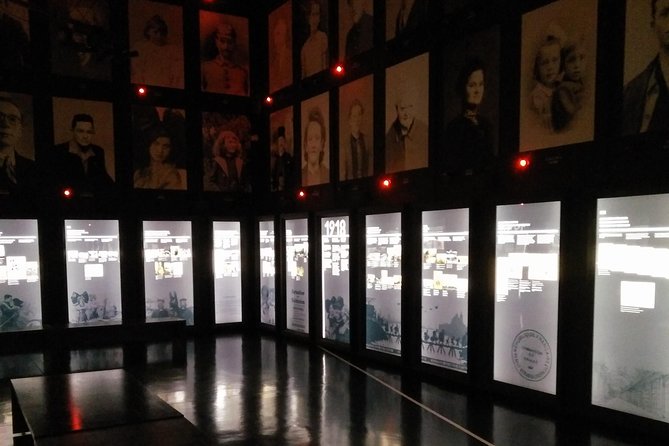
Nestled in the Vosges Mountains of Alsace, the Struthof Concentration Camp first opened its doors in 1941 as one of the smaller Nazi detention facilities established across occupied France during World War II.
Originally intended to hold political prisoners, Struthof soon became a site of unspeakable horrors, where inmates endured:
- Brutal forced labor
- Inhumane medical experiments
- Executions by gas chamber and firing squad
The camp’s remote location, harsh conditions, and the systematic dehumanization of its prisoners combined to make Struthof a symbol of the Nazi regime’s ruthless disregard for human life.
Today, the site stands as a somber reminder of the atrocities committed during one of history’s darkest chapters.
Guided Tour Experience
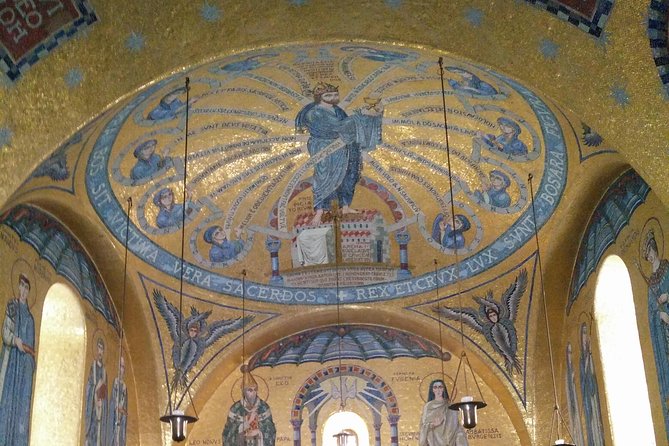
Visitors to Struthof today can embark on guided tours that immerse them in the camp’s harrowing history, offering a poignant and educational experience. These tours are led by knowledgeable guides who bring the site’s grim past to life through detailed accounts and personal anecdotes.
Guests can explore the remaining structures, including the crematorium and gas chambers, gaining a deeper understanding of the atrocities that occurred here. The tour also includes opportunities to learn about the broader context of the Nazi regime and its systematic persecution of individuals.
Practical Information for Visitors
Guests visiting the Struthof Concentration Camp can access the site via private transportation, with pickup available from their hotel accommodation. The tour includes entrance to the site and allows visitors to explore the remaining structures at their own pace.
This solemn experience offers visitors the opportunity to reflect on the camp’s dark history and honor the memory of those imprisoned there. The tour isn’t wheelchair accessible, but most travelers can participate. Guests can organize a private tour for up to 7 people, ensuring a more intimate and personalized experience.
Some key emotions the visit may evoke include:
- Somber reflection on the camp’s tragic past
- Profound respect for the victims’ suffering
- Determination to prevent such atrocities from happening again
- Gems of Alsace: Private Full-Day Tour From Strasbourg
- Two Countries in One Day. Germany, Black Forest and France
- Strasbourg: Private History Tour With a Local Expert
- Strasbourg: Alsace Private Tour With Castle Entry Ticket
- Strasbourg: Private Architecture Tour With a Local Expert
- Christmas Joy in Strasbourg Walking Tour
Emotional Impact of the Tour
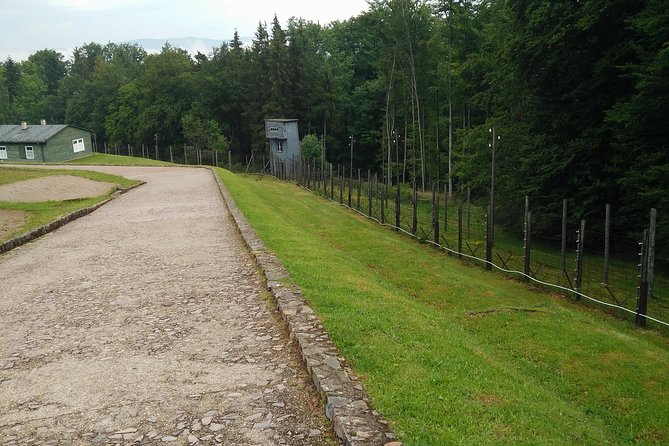
Visiting the Struthof Concentration Camp evokes a somber reflection on the camp’s tragic past, instilling a profound respect for the victims’ immense suffering.
The tour guides skillfully navigate visitors through the haunting grounds, recounting the harrowing stories of those imprisoned and murdered within the camp’s walls.
The preserved structures and artifacts serve as poignant reminders of the horrors perpetrated by the Nazi regime, eliciting a deep sense of contemplation and a renewed commitment to ensuring such atrocities never occur again.
Leaving the site, visitors are left with a heightened appreciation for human dignity and a renewed determination to stand against intolerance and oppression in all its forms.
Preservation and Memorialization Efforts
The Struthof Concentration Camp has undergone extensive preservation efforts to honor the memory of its victims and educate future generations about the atrocities committed there. The site has been maintained as a solemn memorial, with visitors able to explore the remaining barracks, gas chambers, and crematorium. Ongoing preservation work ensures the site’s historical integrity, while educational programs and exhibitions provide powerful insights into the camp’s dark history.
The somber atmosphere of the site encourages reflection on the immense human suffering that occurred there.
Artifacts and personal belongings of prisoners serve as poignant reminders of the individuals whose lives were stolen.
Visitors leave with a deeper understanding of the profound impact of the Holocaust and a renewed commitment to preventing such tragedies from happening again.
Reviews and Ratings
Visitors to the Struthof Concentration Camp have shared their powerful experiences through a series of reviews, shedding light on the profound impact of this historical site.
With an overall rating of 4.5 out of 5 based on 16 reviews, the camp seems to have left a lasting impression on those who’ve visited.
Travelers have praised the educational value of the tour, the knowledgeable guides, and the opportunity to gain a deeper understanding of this dark chapter in history.
However, some have noted the emotional intensity of the experience, underscoring the gravity of the site.
The reviews suggest that a visit to Struthof is a moving and impactful experience for those seeking to commemorate the victims of the Nazi regime.
Frequently Asked Questions
Is Photography Allowed During the Tour?
Photography is generally allowed during the tour, but visitors should check with the tour operator beforehand. Some sites may have restrictions on photography, so it’s best to inquire about the policy before the tour.
How Long Does the Guided Tour Typically Last?
The guided tour typically lasts 1.5 to 2 hours, according to the activity details. The duration may vary depending on the size of the group and the guide’s pace during the private tour.
Are There Any Age Restrictions for the Tour?
There are no age restrictions for this tour. The activity is suitable for most travelers, though it may not be wheelchair accessible. Visitors of all ages can participate in the guided tour.
Can the Tour Be Customized for Specific Needs?
The tour can be customized to accommodate specific needs. The operator offers private tours and can organize circuits for up to 7 people, though the tour isn’t wheelchair accessible.
What Language Options Are Available for the Tour?
The tour offers several language options, including English and French. Customers can inquire about their preferred language when booking the tour, and the tour provider will accommodate their needs to ensure a smooth and informative experience.
Recap
The Struthof Concentration Camp stands as a somber reminder of the atrocities committed by the Nazi regime.
Its history serves as a powerful testament to the horrors faced by those imprisoned within its walls, highlighting the Nazi’s disregard for human life.
The site’s preservation and memorialization efforts ensure that the camp’s grim legacy isn’t forgotten, educating visitors and preserving the memory of those who suffered and perished there.
More Tour Reviews in Strasbourg
- Strasbourg: Guided Walking Tour With Some Testing Sweet
- Strasbourg: Adventure in a Virtual Reality Escape Room
- Best of Strasbourg: Private Walking Tour With a Local
- Strasbourg: Colmar, Eguisheim & Riquewihr Private Day Trip
- Christmas Magic: A Guided Walking Tour in Strasbourg
- Strasbourg: Christmas Market and City 3 Hour Walking Tour
Not for you? Here's more things to do in Strasbourg we have recnetly reviewed
- 2 Best Cruises And Boat Tours In Strasbourg
- 16 Best Christmas Experiences In Strasbourg
- 4 Best Food Tours In Strasbourg
- 4 Best Private Car With Driver Services In Strasbourg
- Cellar Visit and 100% Immersive Vegetarian Meal to Strasbourg
- Discovery Track Game: The Mysteries of Strasbourg
- Strasbourg Small Group Sightseeing Historical Segway Guided Tour
- Private Transfer Strasbourg to Europa Park
- Strasbourg: Gastronomic and Walking Tour in the Old Town
- Discover the Wines of Alsace and Short Introduction to Strasbourg
- Strasbourg: 2-Hour Tour of the Historic Center and Petite France
- From Strasbourg: Colmar, Riquewihr, & Eguisheim Day Trip
